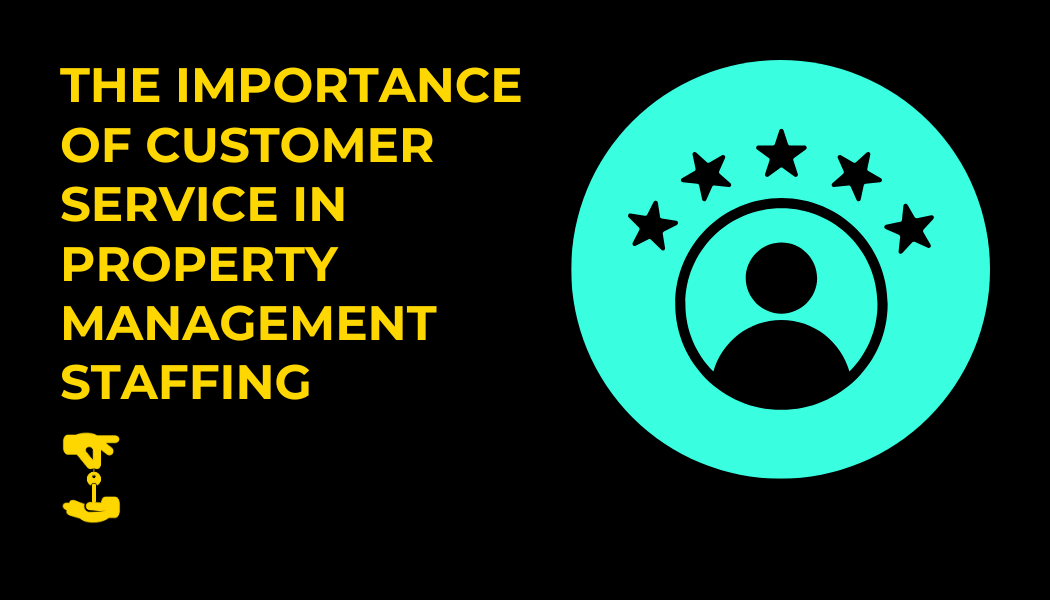October 28, 2024
In property management, the success of any business is closely tied to tenant satisfaction. A positive relationship between tenants and property managers plays a pivotal role in ensuring long-term occupancy and reducing turnover, ultimately leading to higher profitability and fewer vacancies. One of the most effective ways to foster these relationships is through top-notch customer service. When property management staff are customer service-oriented, they create a welcoming, responsive, and supportive environment that significantly impacts tenants' experiences. This blog post explores why customer service is vital in property management staffing, how it contributes to tenant satisfaction, and the benefits it brings in reducing turnover. Why Customer Service Matters in Property Management Property management is unique compared to many other industries because it involves maintaining ongoing relationships with tenants, often over several years. These tenants rely on property managers not only to provide them with a functional and safe living environment but also to address concerns and needs quickly. Every interaction between tenants and property management staff impacts the overall experience, making customer service a central component of success. There are several key reasons why customer service plays a crucial role in property management: 1. First Impressions and Onboarding The first interaction a potential tenant has with a property management team sets the tone for the entire relationship. A friendly, informative, and helpful staff member can make a significant difference in whether a prospective tenant chooses to rent from that property. From answering questions to facilitating tours, customer service during the onboarding phase is crucial. A smooth and welcoming experience not only attracts tenants but also makes them feel confident in their decision, starting the relationship on a positive note. 2. Building Trust and Rapport Trust is the foundation of any successful relationship, including that between tenants and property management staff. When tenants trust their property managers to handle issues professionally and promptly, they are more likely to feel comfortable and satisfied with their living situation. Building trust comes from consistent, reliable communication and responsiveness. Staff who show empathy and understanding when handling tenant requests or complaints contribute significantly to the tenant's overall sense of well-being. 3. Effective Communication Communication is central to any relationship, and property management is no exception. Clear, respectful, and timely communication fosters a sense of trust and reliability. Property managers who take the time to explain procedures, update tenants on maintenance work, or provide information about property policies make tenants feel valued. Proactive communication—such as notifying tenants in advance of scheduled maintenance or changes in policies—demonstrates that the management is attentive to their needs. Tenants are more likely to stay when they feel informed and heard. 4. Resolving Issues and Handling Complaints In any rental situation, problems are inevitable—whether it's a maintenance issue, a billing question, or a noise complaint. What sets a great property management team apart is how they handle these problems. Tenants appreciate prompt, effective resolutions to their issues, and the speed and professionalism with which complaints are handled can either strengthen or weaken the tenant-manager relationship. Customer service-oriented staff understand the importance of listening to tenants' concerns and taking swift action, preventing small issues from escalating into larger disputes. 5. Creating a Sense of Community Properties are not just buildings; they are homes where people build their lives. Property management teams that focus on customer service contribute to creating a sense of community among tenants. Organizing events, communicating about community activities, and encouraging a respectful, harmonious living environment make tenants feel more connected. This connection often leads to higher satisfaction and a desire to stay within the community longer. How Customer Service-Oriented Property Managers Reduce Turnover One of the biggest challenges in property management is tenant turnover. Each time a tenant leaves, property managers must invest time and resources into preparing the unit for the next occupant, including marketing, cleaning, repairs, and screening potential tenants. High turnover can quickly drain resources, while tenant retention can lead to steady cash flow and lower operating costs. Here’s how customer service-oriented property management staff can significantly reduce turnover: 1. Enhancing Tenant Satisfaction Happy tenants are more likely to stay in their units. When property management teams provide excellent customer service, tenants feel appreciated and valued. This leads to higher levels of satisfaction and a lower likelihood of tenants leaving at the end of their lease. Studies show that tenants are more willing to overlook minor inconveniences or higher rental costs if they feel they are being treated well. In contrast, even a perfect property in terms of physical maintenance won’t hold onto tenants if the management staff is rude, unresponsive, or dismissive. 2. Addressing Problems Before They Lead to Turnover Often, tenants leave properties because their concerns are not addressed in a timely or satisfactory manner. It may be a chronic issue with maintenance, unresolved noise complaints, or general dissatisfaction with management's responsiveness. Customer service-oriented staff actively listen to tenant concerns and work to address them before they escalate. By staying proactive, they can resolve potential issues before they cause frustration and lead to a decision to move. 3. Fostering Long-Term Relationships Personal connections matter in any service industry, and property management is no different. When property managers know their tenants' names, remember important details about their living situation, and show genuine concern for their needs, tenants feel more attached to the property. This sense of connection fosters loyalty, making tenants more likely to renew their leases. Staff who go the extra mile to ensure tenants feel comfortable and appreciated make a lasting impact. 4. Creating a Stable Living Environment High tenant turnover disrupts the stability of a community. When tenants constantly come and go, it can create a transient feel, making it difficult for long-term residents to feel settled. Customer service-focused property managers help to maintain stability by cultivating a community atmosphere where tenants feel at home. This sense of continuity encourages tenants to stay longer, as they feel secure in their surroundings. 5. Positive Word-of-Mouth and Referrals Satisfied tenants are often the best advocates for a property. When tenants have positive experiences with management staff, they are more likely to refer friends or colleagues to the property. Word-of-mouth recommendations reduce marketing costs and attract quality tenants. Additionally, positive online reviews can enhance a property’s reputation, drawing in prospective renters who value excellent customer service. This referral cycle leads to lower vacancy rates and fewer resources spent on acquiring new tenants. Best Practices for Customer Service in Property Management Staffing To ensure property management teams provide excellent customer service, it is essential to implement best practices that promote tenant satisfaction and retention: 1. Training and Development Property management staff should receive regular training on customer service best practices. This includes communication skills, conflict resolution, empathy training, and problem-solving techniques. Investing in staff development ensures that they are well-equipped to handle the various challenges that arise in property management. 2. Creating a Customer-Centric Culture Management should foster a culture that prioritizes customer service at every level. From the front desk staff to maintenance teams, everyone should be aware of the impact they have on tenant satisfaction. Encouraging a customer-centric mindset ensures that staff consistently strive to exceed tenant expectations. 3. Implementing Feedback Systems Actively seeking feedback from tenants allows property management to understand what is working and what needs improvement. Implementing regular tenant surveys or providing easy ways for tenants to share their thoughts helps management teams stay proactive. Addressing feedback in a timely manner shows tenants that their opinions are valued and taken seriously. 4. Setting Clear Expectations Tenants should know what to expect from their property management team. Clear communication regarding maintenance schedules, office hours, and response times sets the standard for interactions. When tenants are aware of what to expect, they are less likely to feel frustrated by delays or misunderstandings. 5. Utilizing Technology for Better Service Technology can enhance customer service in property management. Online portals for rent payments, maintenance requests, and communication provide tenants with convenient and efficient ways to interact with management. Streamlining these processes improves the tenant experience and reduces frustration. Conclusion In property management, exceptional customer service is more than just a "nice-to-have"—it is a vital component of building lasting relationships with tenants and reducing turnover. Customer service-oriented property managers help create an environment where tenants feel valued, heard, and supported. These positive interactions lead to higher satisfaction levels, which directly translates into lower turnover rates, fewer vacancies, and a more stable community. By prioritizing customer service in property management staffing, businesses can not only improve tenant retention but also enhance their reputation and profitability in a competitive market. In the long run, the investment in building strong tenant-manager relationships pays off in the form of long-term loyalty and financial success.














